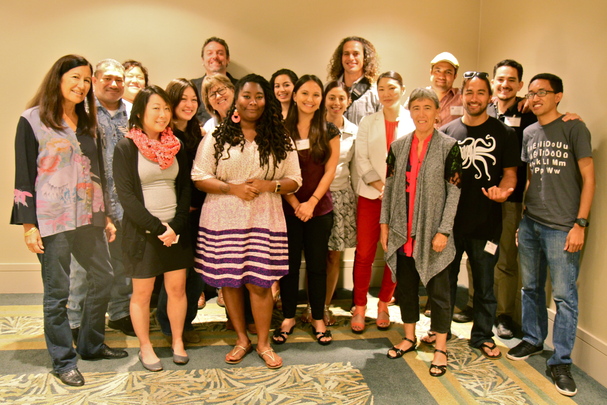
Producing for Public Television Workshop
By Sergio Mataʻu Rapu
Producing for Public Television (PTV) is daunting. Not only are your “clients” a diverse national audience, but also PTV mandates that producers tell fair and balanced stories, which adds pressure on you to get the story right. Fortunately though, there is a big community of Public Television producers out there who have become more and more supportive of one another.
I’ve successfully been able to join the ranks of these PTV producers on the mainland, but being a Pacific Islander based out of Minneapolis, MN, I find myself often wanting to reconnect with my island community. I thankfully got the chance to do so this past April when Pacific Islanders in Communications (PIC) and the Independent Television Service (ITVS) hosted a “Producing for Public Television” conference in Hawaiʻi. The 2-day conference was held in Honolulu and ranged in topic from case studies of three different films, to pitch sessions, and discussions on development, production, and fundraising.
I was asked to prepare a presentation on the strategy that we used to fundraise and develop our hour-long documentary Eating Up Easter. This project, which centers around development and food sustainability on Easter Island (Rapa Nui), received R&D funding from PIC and development funds from the ITVS Diversity Development Fund (DDF). I prepared a presentation on how we staggered our funds for the development phase and how our characters and storylines changed throughout the long development process.
Initially, I thought I would be speaking to a group of young filmmakers who were just starting out, but when I walked into the conference that first morning I was surprised to see who was there. I bumped into seasoned filmmakers who I had met on sets long ago, as well as recent film school graduates. I also met filmmakers who were just finishing projects, as well as other who were in the early development stage of their ideas. The small room was filled with a healthy mix of Pacific Islanders who were burning to tell the stories of their people, and I felt incredibly thankful to be there.
As I started talking about my journey, I realized that I was not teaching but in fact sharing with fellow soldier-storytellers who have already been to battle, or who were about to jump into it. The sense of community in that room was strong, and it made me realize that the conference was not only about producing for PTV, but also about strengthening the network of Pacific Islander producers. As we all began to share our experiences, many expressed similar sentiments about loss of culture, re-defining identity, and taking up responsibility.
The second day of the conference dove deeper into the nuts and bolts of both ITVS’s and PIC’s funding opportunities. There were multiple presentations by Jorge Trelles, Senior Production and Programming Manager (ITVS), NʻJeri Eaton, Programming Manager (ITVS), and Cheryl Hirasa, Director of Program Development & Content Strategy (PIC) about writing proposals, budgeting and creating works-in-progress. Leanne Ferrer, Executive Director (PIC) and Amber McClure, Digital Engagement Manager (PIC), were also present to answer additional questions from the participants.
For me, the most helpful (and exciting) presentation was one about the landscape of PTV, which gave us a clear understanding of how all the different shows on PTV get distributed throughout the vast network of stations (see producer Christen Marquez's recent post on this topic). It was incredibly helpful to understand the inside workings of this extensive network, since most of the time I’m focused on completing a project – not necessarily on getting it broadcasted.
Another very interesting presentation was one about digital content (web-only) and how ITVS and PIC intended to support the creation and distribution of these shorts. It is exciting to hear that even though PTV has an extensive network of “brick-and-mortar” stations, they are nevertheless interested in pushing the bounds of production and distribution online.
Finally, the conference included a pitch session of three new projects by Pacific Islander filmmakers. Participants of the workshop were encouraged to comment on the pitch presentations, which I think greatly helped the filmmakers. Though I can’t talk too much about the projects, I am very excited to see them come to fruition. The passion behind these stories was palpable in their presentations and this same passion resonated through the feedback expressed by the audience.
I have come to find that in this digital age of emerging media it is difficult to find an organization like PIC that is fully committed to supporting genuine stories from independent filmmakers like myself. I greatly look forward to working with PIC in the future to further Pacific Islander stories in the media landscape. This conference, one of hopefully many to come, has not only strengthened my filmmaker network, but has also re-invigorated my determination to carry on our ancient tradition of sharing Pacific Islander stories with the world beyond our waters.
Sergio Mataʻu Rapu is a Rapanui independent filmmaker and producer living in Minneapolis, MN. Learn more about Sergio and his work at www.marafilms.com.
Categories: Training